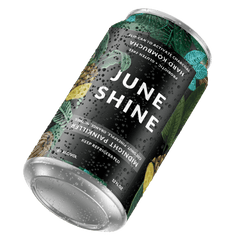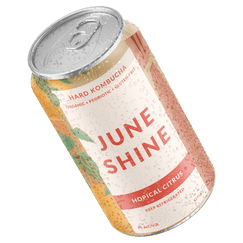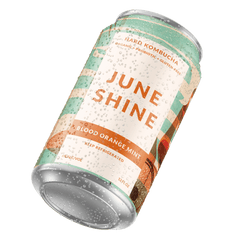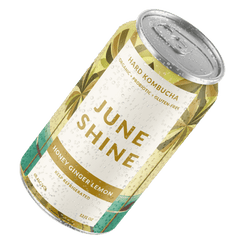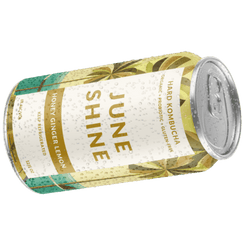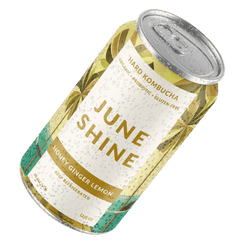5 Surprising Mango Benefits You Didn’t Know

You’ve had mango smoothies, enjoyed mango chunks in a fruit salad, and found pieces in a tropical fruit salsa, but have you ever had mango kombucha? With all of the benefits of mango and the deliciousness of hard kombucha, they’re a match made in heaven.
What Is Mango?
Under the mango’s soft exterior skin, this sweet treat has a fleshy orange fruit waiting to be devoured. Mangoes originated in India and made their way to South America between 300 and 400 AD. They can now be found in subtropical climates like Asia, Australia, Mexico, Hawaii, Florida, and California.
If you’ve got ripe mangos waiting to be eaten, keep them in your refrigerator until you’re ready to snack. If you leave them at room temperature, they’ll continue to ripen, and you might miss their peak. If they’re not quite ripe yet, put them in a paper bag to quicken the process.
We love mango, which is why we’ve integrated it into one of our flavors. Each blend of JuneShine uses Jun Kombucha along with fruit juices, green tea, spices, and honey—no crazy ingredients that you can’t pronounce. Just bright, fresh, thirst-quenching flavors.
The Benefits of Mango
Mango’s where it’s at. These fruits pack quite a punch in the health perks department. Mangos are packed full of antioxidants, vitamins, and minerals.
Let’s dig a little deeper to uncover the top five health benefits of mango.
1. Mangos Support Cardiovascular Health
Did you know the human heart beats over 100,000 times each day? The human body is complex, and our tickers are no exception to the rule.
Maintaining cardiovascular health is important, no matter your age, and adding some mango to your diet has been shown to support and maintain a healthy heart.
For starters, mango is high in potassium and magnesium, which are both vital to keeping our cardiovascular systems running smoothly and efficiently. It’s also worth noting, potassium and magnesium are known to support normal blood pressure levels.
2. Mango Supports Regular Blood Sugar
While fruit tends to be higher in natural sugar, it also provides a substantial dose of fiber. The fiber in our foods helps regulate blood sugar levels and causes sugars to be processed more slowly, without the huge spikes and dips of insulin that come along with highly processed foods.
If you’ve ever been on a low-carb diet, you’re probably familiar with the Glycemic Index. The Glycemic Index (GI) ranks foods from zero to 100 based on how easily their sugars are broken down by our bodies. The lower the Glycemic Index, the better.
Mango pulp ranks at 51. To put this in perspective, a dark lager ranks at 100 on this scale—so mango isn’t particularly high.
3. Mango Supports a Healthy Immune System
We don’t know about you, but we’ve been doubling up on vitamins lately. In just one cup of mango, you receive 60-80% of your recommended daily values of vitamin C.
Vitamin A and Folate are both abundant in mangoes as well. Folate is an important nutrient needed for the body to duplicate genetic material such as DNA as well as for cells to divide. This fruit is literally a powerhouse for the immune system.
4. Mango Helps With Digestion
It’s not always a popular topic of conversation, but what goes in must come out. Mangoes are high in dietary fiber and amylase compounds, which help us… ahem, keep things moving. Dietary fiber is great for getting full faster and feeling satiated longer.
Amylase compounds are essential in dissolving and breaking down starchy foods and substances in our bodies. Plus, mangos contain enzymes that help your body better digest protein. All this helps your body digest food more efficiently and comfortably.
5. Mango Has Tons of Vitamins
Mango flesh is jam-packed with vitamins and nutrient goodness. Think of eating (or drinking) mango as if you’re taking a multivitamin. Yes, they’re that good for you.
Read on to see how a one-cup serving of mango compares to your recommended daily intake.
- Vitamin C - 76% of RDI
- Vitamin A - 50% of RDI
- Vitamin B6 - 20% of RDI
- Vitamin E - 9.7% of RDI
- Fiber - 5 g (20% of RDI)
- Folate - 18% of RDI
- Magnesium - 8% of RDI
- Potassium - 564 mg (16% of RDI)
Final Takeaway
Whatever you’re looking for, mango has you covered.
We believe you should know what you’re eating—and drinking. That’s why JuneShine only uses organic, sustainable, gluten-free ingredients in order to provide you with our hard kombucha. We believe in providing transparent, sustainable ingredients that are better for you and the environment—and mango made the cut.
Now that you know a little bit more about this king of fruits, let us introduce you to Chili Mango Hard Kombucha. This perfectly crafted booch uses mango, pineapple, ginger, habanero chilis, green tea, and Jun kombucha. With only 2 grams of sugar and 100 calories, one serving packs a powerful punch of sweet mango and spicy habanero. We rated this one a 4.5 out of 5 on the spiciness scale, so be prepared.
So sit back, relax, pop open a Junie, and get a little extra mango in your day.
Sources:
Mangoes: Benefits, Nutrition, and Recipes | Medical News Today
Mango: Nutrition, Health Benefits and How to Eat It | Healthline
Mango: Health Benefits, Nutrients per Serving, Preparation Information, and More | WebMD
